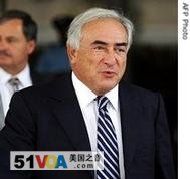Washington
03 March 2009
The head of the International Monetary Fund, Dominique Strauss-Kahn, said Tuesday that the hard-won income gains in Sub-Saharan Africa during the past decade could be wiped out by the still unfolding global financial crisis.
In a new study, the IMF says the financial crisis is likely to have a major impact on low-income countries, particularly in Sub-Saharan Africa.
 |
| IMF Managing Director Dominique Strauss-Kahn (file photo) |
Strauss-Kahn says next week's IMF conference in Tanzania (March 9-11) will focus on Africa's development priorities. The meeting will also look ahead to the summit of leaders of the world's 20 biggest economies in London early next month.
"Those African countries fear, rightfully, that decisions could be made at the global level, by a kind of governance council of the world economy, without their voice and comments," he said.
South Africa is the only African member of the Group of 20.
As the global economic slowdown accelerates, the IMF has downgraded its forecast for economic growth. In October, it predicted that Sub-Saharan Africa would grow by more than six percent this year. Its latest forecast cuts that figure in half. The world economy as a whole is expected to grow by a meager 0.5 percent in 2009 - its worst performance in 40 years.
The IMF's Strauss-Kahn says coordinated action is required to pull the global economy out of its slump.
"There's a real need to always and always to repeat the need for a multilateral approach to a global crisis, to take into account not only what is happening to your own country, but [also] outside," he said.
The International Monetary Fund has been calling for the major countries to implement coordinated increases in government spending and tax cuts to stimulate the global economy.